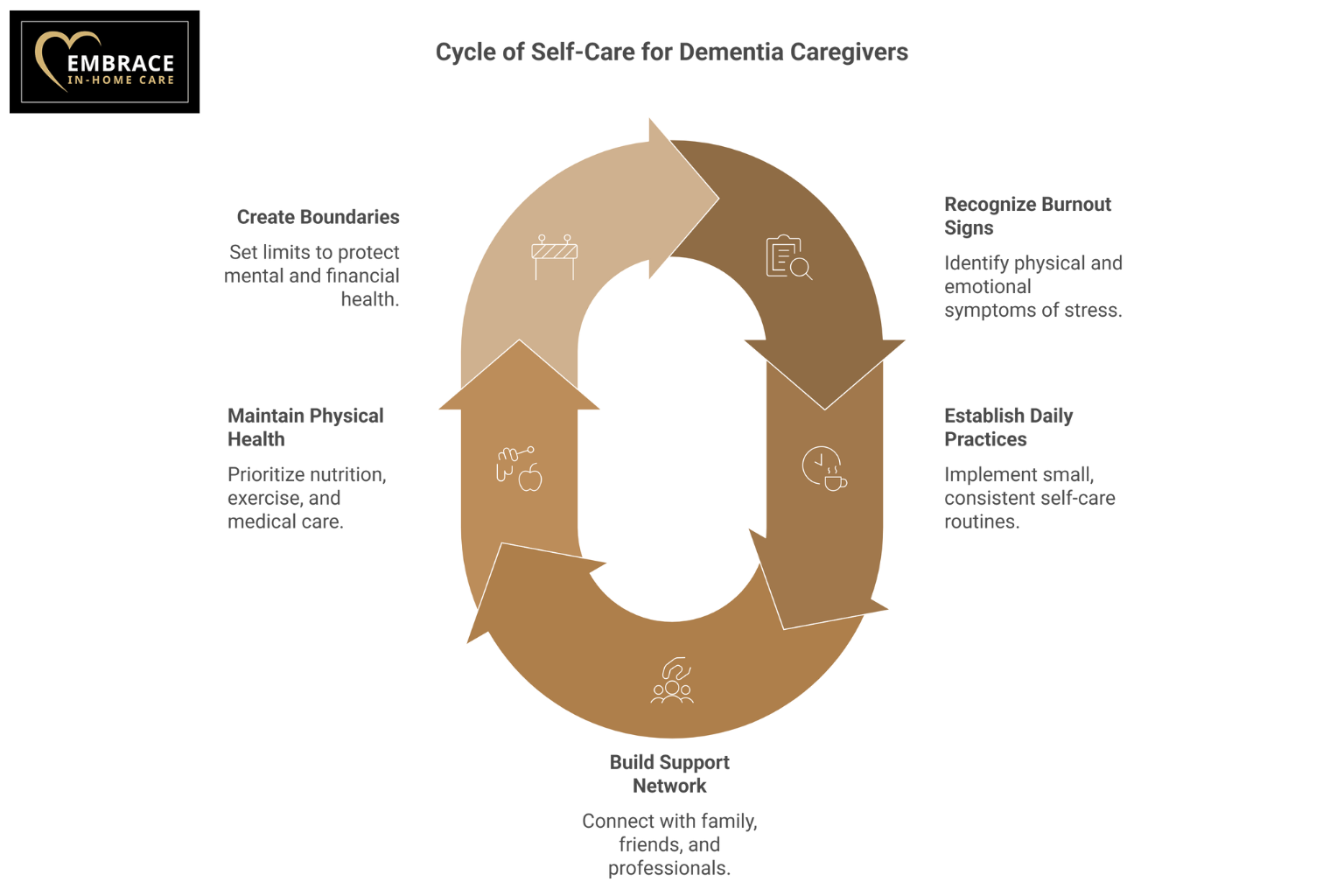
Table of Content
Caring for a senior loved one with dementia demands emotional, physical, and mental energy that can quickly deplete your own reserves. Creating a sustainable self-care routine isn’t selfish—it’s essential for maintaining your health and providing high-quality care for your loved one.
Recognize the Warning Signs of Caregiver Burnout
Understanding when you’re approaching your limits can prevent complete burnout. Caregiver stress often manifests in ways similar to the illness warning signs you monitor in your loved one.
Physical indicators of caregiver burnout include:
- Persistent fatigue despite adequate sleep
- Frequent headaches or unexplained aches and pains
- Changes in appetite or eating patterns
- Getting sick more often than usual
- Sleep disturbances or insomnia
Emotional and behavioral warning signs include:
- Increased irritability or impatience with your loved one
- Withdrawal from social activities or relationships
- Feeling overwhelmed by previously manageable tasks
- Loss of interest in activities you once enjoyed
- Difficulty concentrating or making decisions
- Increased anxiety or feelings of hopelessness
Monitor these signs as closely as you watch for changes in your loved one’s condition. Early recognition allows you to adjust your routine before burnout becomes severe.
If your elderly loved one needs help maintaining a high quality of life while aging in place, reach out to Embrace In-Home Care, a trusted provider of home care. Our caregivers provide transportation to and from medical appointments and social events, nutritious meal preparation, assistance with daily exercise, and help with everyday tasks like bathing, grooming, and light housekeeping.
Establish Daily Self-Care Practices
Small consistent actions throughout your day can significantly impact your overall wellbeing. These practices don’t require large time commitments but create moments of restoration within your caregiving routine.
Morning rituals that support your day:
- Set your alarm 15 minutes earlier for quiet time with coffee or tea.
- Practice deep breathing exercises before getting out of bed.
- Write down three things you’re grateful for.
- Take a brief walk outside, even if it’s just around your yard.
Throughout the day, incorporate micro-breaks:
- Take five deep breaths when feeling overwhelmed.
- Step outside for fresh air during routine tasks.
- Listen to a favorite song while doing household chores.
- Practice gentle stretches during commercial breaks.
Evening wind-down activities separate your caregiver role from personal time:
- Take a warm bath or shower.
- Read a few pages of a book unrelated to caregiving.
- Practice meditation or progressive muscle relaxation.
- Call a friend or family member for conversations unrelated to caregiving.
Build Your Support Network
Isolation compounds caregiver stress and makes self-care more difficult. Actively building and maintaining relationships provides emotional support and practical assistance.
Family and friends can provide valuable support:
- Be specific when asking for help—request particular tasks or time slots.
- Create a schedule that allows different people to help regularly.
- Accept offers of assistance, even if the task isn’t done exactly as you would do it.
- Maintain relationships that aren’t solely focused on caregiving discussions.
Professional support resources include:
- Dementia caregiver support groups, both in person and online
- Adult day programs that provide supervised care for your loved one
- Respite care services that offer temporary relief
- Counseling or therapy specifically for caregivers
- Home health services for assistance with medical needs
Community resources often provide unexpected support:
- Faith-based organizations that offer practical help
- Volunteer programs designed to assist caregivers
- Senior centers with activities for dementia patients
- Local hospitals or medical centers with caregiver programs
Families looking for top-rated Green Valley senior home care providers can reach out to Embrace In-Home Care. From respite care to specialized Alzheimer’s, dementia, stroke, and Parkinson’s care, there are many ways we can make life easier for seniors and their loved ones.
Maintain Your Physical Health
Your physical health directly impacts your ability to provide care and manage stress. Prioritizing basic health needs creates the foundation for sustainable caregiving.
Nutrition strategies for busy caregivers:
- Prepare simple nutritious meals that can be shared with your loved one.
- Keep healthy snacks readily available to maintain energy levels.
- Stay hydrated throughout the day.
- Avoid relying on caffeine or sugar for energy boosts.
- Consider meal delivery services if cooking becomes overwhelming.
Exercise doesn’t require gym memberships or extensive time commitments:
- Take walks with your loved one when possible.
- Use online exercise videos for quick workouts at home.
- Practice yoga or tai chi for both physical and mental benefits.
- Park farther away or take stairs when running errands.
- Do household chores with intentional movement and stretching.
Medical care for yourself remains essential:
- Keep your own medical appointments.
- Take prescribed medications consistently.
- Address health concerns promptly rather than postponing care.
- Discuss caregiver stress with your healthcare provider.
- Stay current with preventive care like annual exams and screenings.
Create Boundaries and Realistic Expectations
Setting limits protects your mental health and prevents resentment from building. Boundaries help you maintain perspective and recognize what you can and cannot control.
Establish clear time boundaries:
- Designate specific hours for caregiving tasks versus personal time.
- Communicate your availability to family members and friends.
- Set limits on how often you check in when respite care is provided.
- Create off-limits times for work calls or caregiving discussions.
Adjust your expectations about what constitutes a successful day:
- Focus on essential tasks rather than trying to accomplish everything.
- Celebrate small victories and progress rather than dwelling on setbacks.
- Accept that some days will be more challenging than others.
- Remember that providing emotional presence is as valuable as completing tasks.
Financial boundaries protect long-term sustainability:
- Set realistic budgets for caregiving expenses.
- Research insurance coverage and benefits available.
- Seek financial counseling if money concerns add to your stress.
- Consider long-term financial planning for continued care needs.
Caring for seniors with dementia can be challenging for family caregivers. Luckily, there is dementia care Green Valley families can rely on. Professional dementia caregivers help seniors with dementia stay safe and comfortable at home by preventing wandering, providing cognitive stimulation, and assisting with household chores. Embrace In-Home Care can be your trusted partner when your loved one needs help with the challenges of aging. Call us today to learn about our high-quality in-home care services.
